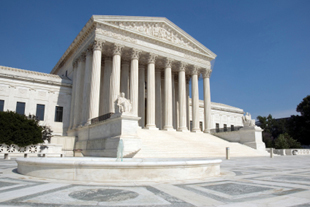
WASHINGTON (BP) — The U.S. Supreme Court will hear a major religious liberty case Wednesday that could impact the hiring practices of religious organizations.
The case, Hosanna-Tabor v. Equal Employment Opportunity Commission, concerns whether a church-based school has freedom from federal oversight in hiring and firing decisions.
“Critics sometimes complain that the court’s religion-related decisions bog down in trivia — How close are the reindeer and snowmen to the Baby Jesus in the holiday display?” wrote Notre Dame law professor Richard Garnett in USA Today. “But this case … is about a big idea, the ‘separation of church and state,’ that really matters.”
The religious freedom principle behind the case is crucial, but the circumstances of the case complicate the matter, and religious freedom advocates acknowledge that the teacher suing the school in question may win in the court of public opinion.
Cheryl Perich was a teacher at the Lutheran Church-run school Hosanna-Tabor, based in eastern Michigan, when doctors diagnosed her with narcolepsy and she missed work for several months. The school, its small staff stretched, hired a replacement teacher for the spring semester. Perich wanted to return to her job during the spring, but the school noted that it had hired a replacement for the semester; the school also wasn’t convinced she was physically ready to return to work. She threatened to sue if she wasn’t reinstated.
The school fired her, saying she had violated church teachings by immediately turning to legal action instead of going through the church’s own process for dealing with such disputes. Perich filed a lawsuit with the EEOC, alleging that the firing was retaliatory for her narcolepsy. That question of retaliatory firing could muddy the broader issue of whether religious schools have autonomy in personnel decisions. The U.S. Sixth Circuit Court of Appeals sided with Perich, saying she should not fall under the “ministerial exception,” as a church employee, so she could sue. The court drew out two columns titled “secular” and “religious” and tallied how many minutes of the day Perich spent on each. The court added the totals and concluded that she spent more minutes on secular education than religious, and so she did not fall under the “ministerial exception” for church employees.
The lawyers for the school blasted the circuit court’s “mechanistic” approach to Christian education.
“In accordance with Lutheran teaching, she was expected to ‘integrate faith into all subjects,'” they wrote in their merit brief for the Supreme Court. “She did so, for example, by teaching a student about the Lutheran doctrine of justification by faith in connection with an essay in English, answering questions about God in social studies, commenting on God as Creator in science, and discussing theological questions during a parent-teacher conference.” The ministerial exception, a decades-old rule the courts created, applies to employees who are “important to the spiritual and pastoral mission of the church,” but circuit courts disagree about what that means.
“The courts of appeals … agree that [the ministerial exception] extends beyond pastors, priests, and rabbis, but not as far as janitors or secretaries,” the lawyers for the school wrote in their merit brief. “The question is where to draw the line.”
But if the court rules against the school, that doesn’t mean religious organizations will lose all protections on hiring matters. Stanley Carlson-Thies, the head of the Institutional Religious Freedom Alliance, explained in an analysis of the case that most religious organizations are protected by the “religious exemption” in Title VII of the Civil Rights Act of 1964.
“This exemption was created by Congress, not the courts, and it applies to every single job position in a religious organization, whether the position is ‘ministerial’ or not,” Carlson-Thies wrote.
However, he adds, the “religious exemption” only protects organizations’ personnel decisions based on religion. In this case, the Lutheran school must prove that it fired the teacher for religious reasons — that she had violated church rules, which could be difficult before a court that is sensitive to claims of retaliatory firing.
–30–
Based on reporting by Emily Belz, who writes for World News Service, where this story first appeared.

















